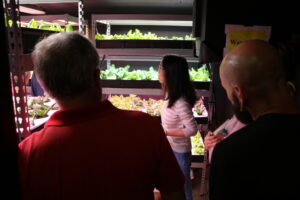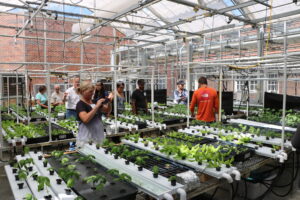Extension Programs
(i). Greenhouse and Indoor Hydroponics
Hydroponics is a rapidly developing specialized and capital intense farming system in the U.S. Commonly grown vegetables in hydroponics include leafy greens, especially lettuce. By utilizing controlled environment facilities like greenhouses and indoor systems, hydroponic growers can produce crops year-round to increase their income potential. However, hydroponics is a new and continuously evolving field. Many Indiana growers who have ventured or planning to invest lack fundamental and/ or updated knowledge of science and technologies associated with the hydroponics. These gaps increase risk and prevent growers from making appropriate and informed decisions related to production. This situation challenges the sustainability of the hydroponics industry in Indiana.
The objectives of this program are: (i). Conduct applied hydroponic research and develop region-specific information on best crops and varieties, production systems, efficient supplemental lighting systems and heating technologies, strategies to manage nutrient solution, affordable plant health monitoring systems and best practices for producing E.coli-free hydroponic lettuce and (ii). Provide high quality and research-based training on science and technological aspects related to hydroponic production to Indiana growers and extension educators through workshops.


(ii). Floriculture
Floriculture industry is declining in many states including Indiana. This is due to low profits. Increased productivity and crop quality can increase profits. Among other factors, nutrient management is an important determinant of productivity and crop quality in floriculture. Many sensor technologies are available to monitor nutrient-use in greenhouses. However, the grower adoption of sensor technology is low due to the complexity and cost of technology. Because of this, many growers use experience and visual observations to manage nutrients during production. Often growers apply too much of nutrients to avoid deficiencies. Overall, this reduces the productivity and crop quality and increases the costs.
The objectives are (i). Develop new sensor technologies that are attractive, reliable and easy-to-use, (ii). Establish sensors at grower sites and enable growers to experience new technologies and (iii). Organize a grower conference to share research on new technologies and grower experiences.

(iii). PK-12 Education
Obesity is one of the most pressing public health problems in Indiana. Nearly 34% of children (10-17 years of age) are overweight or obese and this places them at an elevated risk for other health complications. The costs are staggering in terms of the burden on the health care system, lost productivity and quality of life. This is mainly due to poor food choices made by many children, which leads to excess energy consumption, specific nutrient excesses (e.g., salt) and deficiencies (e.g., fiber, folate, magnesium, calcium, iron). Collectively, these are associated with an array of chronic health disorders such as hypertension, cancer, and osteoporosis.
The objective of the program is to use a theory of change model that targets children’s accessibility and knowledge of leafy greens and healthy eating through STEM-based experiential learning using an indoor leafy green production facility to shift their preferences from a less favorable to a more favorable view of leafy greens and to establish appreciation for healthy food.
